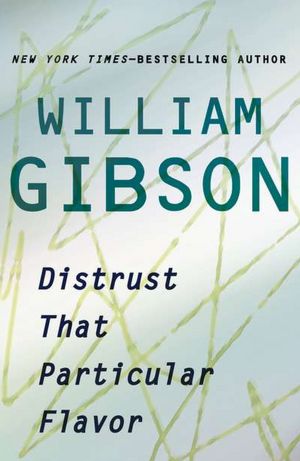
From collection of William Gibson’s articles, talks and book forwards.
I belong to a generation of Americans who dimly recall the world prior to television. Many of us, I suspect, feel vaguely ashamed about this, as though the world before television was not quite, well, the world. The world before television equates with the world before the Net—the mass culture and the mechanisms of Information. And we are of the Net; to recall another mode of being is to admit to having once been something other than human. pg 11
But I’m not sure I really enjoy the music any more than I did before, on certifiably low-fi junk. The music, when it’s really there, is just there. You can hear it coming out of the dented speaker grille of a Datsun B210 with holes in the floor. Sometimes that’s the best way to hear it. pg 13
I’m sometimes asked whether or not I think the Net is a good thing. That’s like being asked if being human is a good thing. pg 14
Nobody predicted commercials, Hollywood Squares, or heavy-metal music videos. pg 15
“Yet once admitted to the culture’s consensus pantheon, certain things seem destined to be with us for a very long time indeed. This is a function, in large part, of the Rewind button. And we would all of us, to some extent, wish to be in heavy rotation.”
The end-point human culture may will be a single moment of effectively endless duration, an infinite digital Now.
Had nations better understood the potential of the Internet, I suspect they might well have strangled it in its cradle. Emergent technology is, by its very nature, out of control, and leads to unpredictable outcomes.
In terms of the future, however, the history of recorded music suggests that any film made today is being launched up the time-line toward end-user technologies ultimately more intelligent, more capable, than the technologies employed in the creation of that film.”
“Which is to say that, no matter who you are, nor how pure your artistic intentions, nor what your budget was, your product somewhere up the line, will eventually find itself at the mercy of people whose ordinary civilian computational capacity out- strips anything anyone has access to today.”
Genuinely evolved interfaces are transparent, so transparent as to be invisible.
Today, reliance on broadcasting is the very definition of a technologically backward society.
“In the age of the leak and the blog, of evidence extraction and link discovery, truths will either out or be outed, later if not sooner. This is something I would bring to the attention of every diplomat, politician, and corporate leader: The future, eventually, will find you out. The future, wielding unimaginable tools of transparency, will have its way with you. In the end, you will be seen to have done that which you did.”
Postindustrial creatures of an information economy, we increasingly sense that accessing media is what we do.
And that, I would argue, is what the World Wide Web, the test pattern for whatever will become the dominant global medium, offers us. Today, in its clumsy, larval, curiously innocent way, it offers us the opportunity to waste time, to wander aimlessly, to daydream about the countless other lives, the other people, on the far sides of however many monitors in that post- geographical meta-country we increasingly call home. It will probably evolve into something considerably less random, and less fun—we seem to have a knack for that—but in the meantime, in its gloriously unsorted Global Ham Television Postcard Universes phase, surfing the Web is a procrastinator’s dream. And people who see you doing it might even imagine you’re working. – New York Times Magazine, June 1996
I very much doubt that our grandchildren will understand the distinction between that which is a computer and that which isn’t.
The world’s cyborg was an extended human nervous system: film, radio, broadcast television, and a shift in perception so profound that I believe we’ve yet to understand it. Watching television, we each became aspects of an electronic brain. We became augmented.
The physical union of human and machine, long dreaded and long anticipated, has been an accomplished fact for decades, though we tend not to see it. We tend not to see it because we are it, and because we still employ Newtonian paradigms that tell us that “physical” has only to do with what we can see, or touch. Which of course is not the case. The electrons streaming into a child’s eye from the screen of the wooden television are as physical as anything else. As physical as the neurons subsequently moving along that child’s optic nerves. As physical as the structures and chemicals those neurons will encounter in the human brain. We are implicit, here, all of us, in a vast physical construct of artificially linked nervous systems. Invisible. We cannot touch it.


